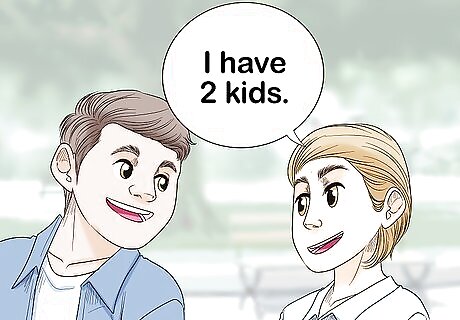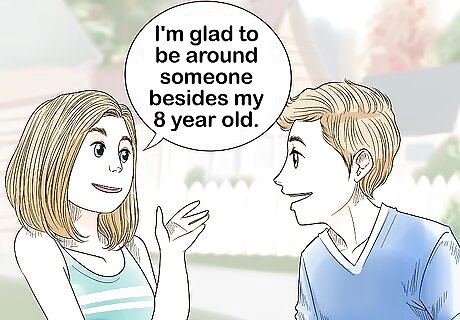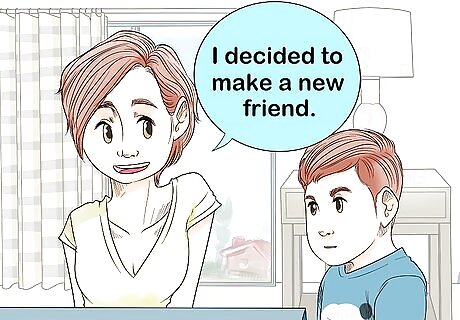
views
Bringing up the Subject

Mention your child to your date as early as possible. The longer you wait to tell your date that you’re a parent, the harder it will be. In addition, it could make it seem like you’re trying to hide the fact that you have a child. It doesn’t have to be the very first thing that you say, but you should be upfront about it from the beginning. Bringing up your status as a parent early on will also help you weed out any potential partners who aren’t cool with dating a single mom. Don’t worry, though–that just means they’re in a different stage of their life than you are. There are plenty of people who won’t mind at all!

Mention your child in a joke if you need help breaking the ice. Don’t put too much pressure on yourself or feel like this has to be a drawn-out, serious conversation. Mentioning that you have a child in a lighthearted way will show your date that you love being a mom. If you’re not sure how to approach the subject, try bringing it up in a humorous way! For example, if the conversation is going well, say something like, “It’s really nice to have a grown-up conversation. I spent all day debating with my 3-year-old about which PJ Mask is the best!” If your date asks if you’ve seen any good movies lately, you could say, “Well, my 12-year-old is obsessed with musicals right now, so I’ve seen Hairspray 3 times this week, does that count?” Pay attention to your date’s reaction, but don’t make a big deal out of it. If they seem surprised, change the subject and give them a little time to get used to the idea.

Ask if your date has kids if you feel nervous about telling them. As you’re getting to know each other, ask, “Do you have any children?” You might be surprised to find out you’re not the only single parent at the table! Even if your date doesn’t have any children, this can be an easy way to bring up the subject, and it feels more conversational than just blurting it out. If your date does have kids, say something like, “That’s great! I have an 8-year old too!” If your date says they don’t have children, you could answer with something casual, like, “I have a little boy, and he’s so much fun!”

Talk about your child in a positive way. If you talk about being a single mom like it's a heavy burden or something to be ashamed of, your date may feel like it’s a negative part of your life. However, if you speak with confidence and optimism, your date will be more likely to see you as a strong person dealing with a tough situation. You could say something like, “I love being a mom! It’s not always easy, but my 5-year-old daughter is really smart, and she really motivates me to do my best every day!”

Share more background about your situation as you feel comfortable. You don’t have to give your date all the details about why you’re a single mom, but you can offer a little context for your situation. In particular, it could set your date’s mind at ease if you let them know that the other parent is out of the picture. For example, you might say, "My daughter's father passed away when she was just a baby," or, "His dad is remarried, and they have visitation every other weekend." Avoid speaking negatively of the other parent, even if things ended badly. It’s not good for your child, and it might make your date think you’ll talk badly about them if the relationship doesn’t last. Remember, you don’t have to disclose anything you’re uncomfortable sharing. It’s fine to keep your past to yourself, especially when you’re just getting to know someone. As you start to become closer, you can share stories about your past gradually.
Be straightforward about what you're hoping for from the relationship. If you are dating because you want to find a serious partner, you should let your date know early on that you’re interested in a long-term relationship. However, if you just want a no-strings-attached relationship for right now, be clear about that, too. If you’re hoping to find a serious relationship, you could say something like, “I’m really hoping to meet someone I can be with for a long time,” or “I’m looking for someone who has the same long-term goals as I do.” If you just want to date casually, say, “I’m not looking for anything serious. I just want to have fun while I figure out what I’m doing next.” Whatever your aim, communicating your expectations early on helps your date understand what role you'd like them to play. In turn, this gives them the opportunity to bow out early if they are not okay with the circumstances.
Moving Forward with the Date

Reassure your date that you aren’t in a hurry if they feel apprehensive. If your date seems unsure about the idea of dating a single mom, but they also seem to really like you, let them know that you don’t have any expectations of them, and you’re not in a hurry to find your child a new parent. Try saying something like, “We’re doing fine on our own, but I think it’s really important for me to still enjoy adult relationships.”

Don't take rejection personally. Sometimes, you might come across someone who’s just not ready to have a child in their life. This can be really hard, especially if you like the person a lot, but try to remind yourself that it doesn’t mean there’s anything wrong with you; it’s just the situation you’re both in. Respect their choice and keep looking for the person who’s right for you. If a rejection is making you feel bad about yourself, boost your self-esteem by making a list of reasons why you're a great catch. Reread the list whenever you doubt your worth. Remind yourself that it’s best to find out early on if the other person isn’t interested in dating someone with a child. A rejection would hurt a lot more later, once you’re beginning to feel more invested in the relationship.

Take your time introducing your date to your child. Even if your date is totally cool with you being a single mom, you should still wait until you’re sure the relationship is stable and serious before you bring your date around your child. Usually, you should wait until you’ve been dating someone for a few months before setting up an introduction with your child. Children form attachments easily, and it can be really hard on a child to have a steady stream of dates entering and leaving their life, especially if they’ve already experienced their parents splitting up. If you’re not sure where you stand, talk to your date to gauge how serious you are. A simple question like, "So, are we exclusive?" or "Where do you see this going?" can help you determine if you’re both on the same page. When it’s time, try to set up the meeting in a way that will make your child comfortable, like inviting your date over to your house for pizza and a movie. If the other parent hasn’t been out of the house for long, consider introducing your date to your child somewhere neutral, outside your home.

Find a good balance for co-parenting. If your child’s other parent is in the picture, you'll need to have a good plan in place for the role they play in comparison to the role your date plays in parenting. A good way to do this is to sit down with your new partner and your child’s other parent and have an open and honest conversation where you work out a co-parenting plan. Make it clear that your new partner is not replacing the other parent. However, the role each person plays will depend on how involved the other parent is in your children's lives. For instance, in some cases, the other parent might get the children every other week or on weekends, so they have a large role in their parenting. However, in other cases, children may only see their other parent every now and then, meaning they play less of a role in their lives. Be careful about getting your date involved in parenting too early unless it’s absolutely necessary.
Telling Your Child You're Dating

Have a brief, casual, and age-appropriate talk with your child. You should never lie to your child about your dating life, but that doesn’t mean you have to give them all of the details, either. If you’re leaving to go on a date, let them know that’s where you’re going. Use their age and maturity level as a guideline for how to have this discussion. For example, you might tell a younger child, “Mommy is going out to visit a friend for a few hours while you stay with Grandma. I love you!” You might say to an older child, "A guy from work is taking me to the movies. It's not serious right now, but I’ll let you know how things go!"

Maintain consistency in your parenting no matter what. It’s important for your child to know that no matter who else is in your life, your relationship with them will not change. Early on, set firm boundaries about the role your partner will play in your child’s life. Even if they come over every day or they move in with you, you should still be the primary disciplinarian and the household, and you should be the one to make major decisions that will affect your child. Keep the same household rules and expectations in place for your children that you’ve always had, and ask your date to adjust to the circumstances. Any new partner should also respect the role that your child’s other parent will play in their life.
Be patient if your child shows resistance to the person you’re dating. Change is really hard for kids, and even if you’re dating a really nice person, your child might act out or be mean to that person. It’s not really them, it’s the situation. Don’t try to force your child to like the person, but do ask that they act in a way that’s respectful. Try having a talk with your child where you acknowledge their fears and reassure them that you still love them, even if you start dating someone new. You could say something like, “I can tell that you feel afraid that things are changing, but I love you and that will never change. I hope you’ll give my new friend a chance.”

















Comments
0 comment